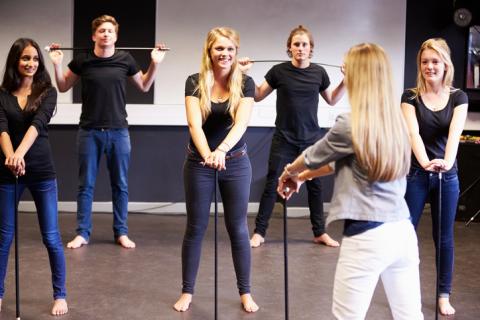The University Women in the Arts scheme aims to address why although so many more women study the arts, comparatively few end up working in the arts industry - particularly in artistic and leadership roles.
For example at the University of the Arts London more than 70 per cent of students are female, but British Theatre Consortium figures have shown only about 30 per cent of professional playwrights are women and, according to recent University of the Arts figures, only 30 per cent of professional artists in galleries in London are female.
What can we do to address this imbalance?
On my first day at university, the principal in her welcome address said: “Every year I see talented women arrive, the best in their year. Then they get a boyfriend and start helping him and come out with a 2:1”.
Resilience is key. One of the most important aspects of this scheme has been hearing about the challenges the female mentors have faced and how they have overcome them. It is important to know that bad things happen to us all, like being passed over for a promotion or made redundant. It is important that we keep going and find a different route if the one we were pursuing isn’t possible.
Another issue is of women not helping women. I was on an interview panel once and there were two women on the panel (among others) and two women (and about five men) being interviewed. At the end of the presentations, we were asked: “Is anyone unappointable?”. The other woman on the panel suggested the two women candidates were unappointable.
One of the students at University Women in the Arts put it brilliantly saying: "Unfortunately in society and the media, women are pitted against each other.”
Below are some views on the importance of the University Women in the Arts scheme from women who have secured prominent roles in the arts.
Jennifer Tuckett, director at University Women in the Arts
Vicky Featherstone, artistic director of the Royal Court Theatre
When you are starting out, the challenge is: “how am I going to get going?” You can deal with that challenge by not overthinking that and just making work. Be open to everything and see where it leads.
I also think it is important not to put things off. If you don’t think you’re ready now, you will never think you’re ready. Just do it, and learn from it if it doesn’t work.
Kate Rowland, founder of BBC Writers Room and the former creative director of new writing at the BBC
When women have ideas for plays and don't know what to do with them I always advise them to just put it on. Now with technology, you can do anything - you can publish, you can put on plays. Don’t wait for somebody because quite often they’ll only go with what they know and what they like, they might not take those risks. See if there’s a way you can do it yourself, and don’t be afraid of it. It doesn’t have to cost a lot of money.
A lot of us are afraid of failure. If you’re going to do something interesting, then you’re probably going to have to fail at some point. I think it is really important to also know what you want to do. Don’t look for someone else to tell you what to do.
Anne Edyvean, producer and head of BBC Writers Room
I have been in the right place at the right time, but I’ve also been in the wrong place at the wrong time. Always appreciate your luck when you have it and appreciate the person who gave you that chance.
At interviews, be bursting with ideas. Before I did my first BBC interview I managed to find a friend of a friend who worked in documentaries and I asked for advice. He told me to go in with loads of programme ideas which I did. And thank god for that advice.
I had somebody come in and do work experience with me once. They wanted to shadow a script editor and so I assumed he wanted to become a script editor. He in fact wanted to be a producer but when I asked him why, he didn't have any reason for that. He didn’t have a passion for anything. He just knew, in the pecking order, he wanted the big chair.
I would also recommend being good at every stage of your career and don't think you are above any job. Everyone has to buckle down and do every job no matter how small.
Kate Bryan, head of collections at Soho House and television presenter
It is not just a pleasure to be part of this special event, but in some senses an obligation. Women must help women. Those starting out in the arts need to believe they have value as an individual and that their success is part of a larger framework that depends on women empowering other women to create a balanced landscape.
Pinky Lilani, founder of the Women of the Future Programme
On International Women’s Day, we are delighted to be partnering with University Women in the Arts, to inspire women in the arts by providing a platform for successful women. It is imperative that we help students hear stories of success by making role models visible. We hope our collaborative engagement will influence the next generation to fly even higher.
For more information go to: www.universitywomeninthearts.com

Comments